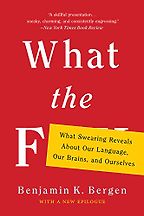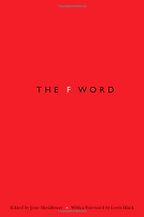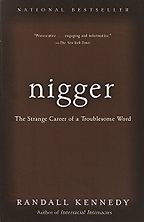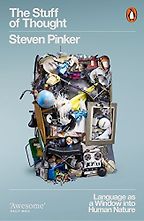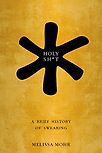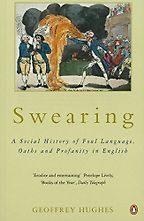We talk about “swearing”, “obscenity”, “profanity”, “cursing”, and “expletives.” By and large, these have all become synonyms for swearing as we understand it today. But originally, they had distinctive identities. Can you untangle them a little?
I think people use the word “swearing” today to refer to any word that has an emotional power in excess of its literal meaning. In one of the books I’ve recommended, Steven Pinker says that swearing “kidnaps your attention.” Swearing involves words that, when you hear them, cause a physical and an emotional reaction.
If you see a list of a hundred words, you’re more likely to remember the swear words. If you are asked to list the ones you remember, the top ten will be the swear words. Skin conductance tests, which measure how sweaty your palms get, find that it increases when you hear swear words. And, as some of the books that I’ve picked describe, swear words are actually stored and processed differently in the brain than other words. So, they are more directly connected to people’s emotions. These are really powerful words. And they are more powerful than they should be, because “fuck” means the same thing as “sexual intercourse” but one is like oh my god and the other is whatever.
“Swear words are actually stored and processed differently in the brain than other words”
Originally, swearing was raising your hand up to God and swearing to tell you the truth: taking an oath before God. Cursing was calling the wrath of God down upon somebody. Profanity is the opposite of sacred—in a religious context, it was something that was insulting to religion. An expletive was meaningless filler. It could have been something as innocuous as “um” or “well” or “like”, but later came to refer to words like “bloody,” “damned” and other swear words.
I really enjoyed your own book on swearing—a fascinating and rigorously researched cultural history that was so much fun to read. With an eye to its title, Holy Sh*t, what would you say are the main sources for our swear words?
The main sources of swearing have changed in interesting ways over the years. At first, they were related to the holy—words about God and about Jesus Christ’s body parts done in a way that were thought to be displeasing to God and thus blasphemous. Those were the original ones.
Then, it moved to what I jocularly call the “shit”: words about the human body and the actions that the human body does—that is, sex and excrement. Now, we’re moving into a period of time when they are racial slurs, which may or may not be identified with the body. Those are the words with the most power today.
Having written an entire book on swearing, have you desensitised to it at all? Are you more likely to use swear words, or do you use them less because you’ve spent so much time tracing their complicated histories?
It still goes through cycles. Sometimes I use them a lot and other times I’ll use them less. There’s a funny subset of people who hear that I write about swearing and then try and shock me by using bad words. And that never works! So, I’ve definitely desensitised to that. You can swear at me all you want. I’ve heard it before. In that sense, it has desensitised me. But I try not to swear too much. I’ve started meditating and am trying to be calmer.
Let’s look at your books. Your first book is Geoffrey Hughes’ Swearing: A Social History of Foul Language, Oaths and Profanity in English. Can you tell me about this and why you’ve picked it?
This is the one probably most like my own book. My book is a history of swearing and so is this one. This is really interesting because he talks about the way swearing has changed over the years and has a lot of great examples and funny stories. For me, the most interesting parts are his exhaustive word lists—he’s got 50 or so euphemisms for “God,” for example, from “gog” to “cokk” to “Great Scott!”
He also talks about some of the interesting ways swear words change, like the “feminization of ambisexual terms,” where words that were once neutral or positive when used of men become insults when used of women, as with “scold,” “wench,” and “harlot.”
One of the things that is so interesting about social histories of swearing is seeing how the most incendiary words in one period can become mere linguistic fossils a few centuries later. I’m thinking of words like “sard” and “swive”—can you say a little more about that?
“Sard” and “swive” both mean “fuck.” They start out as direct but non-offensive words for having sex. “Sard” appears in an Anglo-Saxon translation of the Bible: rather than “Thou shalt not commit adultery”, it’s “Don’t sard another man’s wife,” which today would be “Don’t fuck your neighbour’s wife.” Swive too appears all over the place in the Middle Ages. By the time we get to the Renaissance, though, people are starting to categorize them as “obscene,” just like “fuck.” And then they disappear, replaced by “fuck.” Having too many swear words for the same thing dilutes the charge.
“Having too many swear words for the same thing dilutes the charge”
Most of our current swear words were around in the Middle Ages too, but weren’t considered bad. “Cunt” appears in some manuscripts of the Canterbury Tales, for example, and in people’s last names—“Gunoka Cuntles,” “Robert Clevecunt,” and in names for streets and plants. “Fuck” appears a little later, and in my book I say that it is obscene from the get-go, but there’s new evidence that it too was around for much longer, and like its brethren not obscene. A “John le Fucker” was discovered in some court records from 1278. We always knew about people with “fuck” as a last name—there was a “Fuckebegger,” a “Fukkebotere” (Fuckbutter), and (my favorite) Roger “Fuckbythenavele”—but scholars dismissed these as not really examples of “fuck.” They were supposed to be variant spellings of words meaning “to hit” or “soldier,” not “to have sex.”
But with the discovery of yet another Fucker, and all the medieval people with bad words like “cunt,” “shit,” and “arse” in their last names, I think probability is on the side of “fuck” meaning “fuck” here.
And swear words that we recognise today may make surprising appearances in the history of literature. For example, you will find some in the King James Bible and the first English translation of Homer.
Yes, there’s “piss” in the King James Bible. It talks about destroying “him that pisseth against the wall.” People speculate that that’s just a vivid way of saying “all men”—a reference to men peeing standing up. In an earlier translation, from the 14th century, you get “the part of the body by which turds are shat out,” “arses,” and “bollocks.”
Again, these were direct, but not “bad” words at the time. But, of course, it’s totally inappropriate to our understanding of religious language now. In 1616, George Chapman published, not the first, but what he hoped would be the definitive edition of Homer, and he called one of his poetic rivals a “Windfucker” in the preface.
Historically, swearing intersects with class in curious ways as well. We have the expression “swearing like a lord” as well as “swearing like a tinker.” So, somehow an affiliation emerged between swearing and the working-class as well as between swearing and the aristocracy.
Yes, those are the two stereotypes. In Henry IV Part I, Hotspur says to his wife, “you swear like a comfit-maker’s wife”, and tells her instead to swear “like a lady as thou art.” So, we have the idea that swearing is both aristocratic as well as lower-class. And that does tend to be borne out in studies.
“We have the idea that swearing is both aristocratic as well as lower-class. And that does tend to be borne out in studies”
Another book that I could have put on the list is Swearing in English: Bad Language, Purity and Power from 1586 to the Present by Tony McEnery. It studies English speakers by class and how much they swear and what sorts of words they use. I think the lower classes swear the most, but the upper classes swear almost the same amount and use more powerful swear words.
Your book also argues that swearing becomes moralised—seen as immoral rather than impolite—around the time of the rise of the bourgeoisie as a distinctive social class following the industrial revolution.
Yes. That’s where it’s not just that lower-class people are doing it and it’s fine, but it becomes interpreted as a sign of their terrible morals and their lack of education. It becomes seen as vulgar and wrong.
Your next book is What the F: What Swearing Reveals about Our Language, Our Brains, and Ourselves by Benjamin K Bergen, a professor of cognitive science at University of California San Diego.
This is the newest book on the list. It’s a really good general summary about how swearing works. It’s not so much interested in the history, although it does cover it a bit, but it’s got a big discussion of swearing and the brain. It talks about how swearing is this funny combination of left-brain and right-brain speech.
The left brain is the one responsible for propositional speech—what we’re doing now, where you’re thinking of the meaning you want to convey, and finding the words. The right brain is responsible for memorised speech like song lyrics, ABCs, and, as it turns out, swear words. Right-brain speech is also more closely related to the emotional centres of the brain—the amygdala and basal ganglia. He also looks at swearing in other languages, too.
He gives a picture of swearing being really cognitively distinct from the rest of our language use. For example, there are people with aphasia, who cannot communicate through speech at all, but can somehow still swear.
Yes, it’s so fascinating. I’m personally interested in that because it happened to my grandmother, which is the story I start my own book with. She had some sort of dementia, Alzheimer’s probably, and lost the ability to speak. We were wheeling her around and her wheelchair went over a bump, and all of a sudden she went, “Shit!” It was out of nowhere. She hadn’t spoken in so long. But that part of the brain still worked; she still felt fear when she bumped and so she said “shit!”
There’s a range of different experiments which show that swearing can increase your ability to withstand pain.
Yes! We always imagined that works—you would swear when you hit your hand with a hammer—but it was great to have that scientific confirmation. There’s the ice bucket experiment where people could put their hand in the cold water and keep it there longer if they were saying “shit! shit! shit” rather than “shoot! shoot! shoot!”. But then someone did a follow-up experiment which revealed that if you were a habitual swearer, then it worked less well. So, you have to be a judicious swearer for it to work.
He also argues that, to the best of our knowledge, there’s no empirical evidence that exposure to swearing harms children compared to the sort of violent imagery in which they’re saturated these days. Do you think we should be more permissive with children swearing? What is the core of our resistance to having children swear?
That’s a good question because it is a longstanding thing. You go back to the Renaissance and the very beginning of the idea of obscenity, and you have Thomas Elyot saying that the hearts and brains of children shouldn’t be exposed to this type of terrible language.
Originally, it was based on the worry that these words were powerful and could lead directly to sex and violence. From reading books or hearing people talking about fucking, children would be exposed to it and then the idea would worm itself in there because these words have such power. But we want to think of children as innocent, having nothing to do with sex, or violence, or volcanic anger. Swear words are the words that most directly tie into all these taboo areas, and we don’t want to think of them in relation to our children.
I take your point, but if your child turns around and is really pleased with something they’ve done at school and they say “it’s fucking brilliant, mom!” would you have a similar resistance in that case? There’s no anger there.
It’s hard to say because it varies by person. You can see lots of videos of kids swearing on YouTube and BuzzFeed and social media. Of course, there is a big subset of the population that is genuinely horrified by this, but today I think most people would find it funny if a kid turns around and says, “Ahhh where the fuck is mom?” When I hear kids swearing, I usually think it’s funny. But my nephew, when he was about five, got really angry and called my daughter a “bitch”—and he meant it—and I thought, Oh my god, you cannot say that!
Your next book is The F Word by Jesse Sheidlower. Tell me about this one.
This is a great one for showcasing the variety of swearing and all the circumstances in which you can use this one word. It’s all about “fuck.” It’s basically just a dictionary entry, but it sold really well. People are so fascinated with swearing that we like paging through definitions! You can just see how many ways it’s used—as a verb, an adjective, an interjection, and in all these different compounds, as well as euphemisms for it.
It starts with “absofuckinglutely” and ends with “zipless fuck,” and in the middle has “dumbfuck,” “frig,” “unfuckable”—so many great words. He’s done this excellent research, so you can see the dates when they were all first used, with quotes. The only one I would have included that’s not in there is “unclefucker” from South Park but maybe that got wider currency.
In terms of the flexibility of the word and the constructions it can be embedded in, it reminds me of Anthony Burgess’ book A Mouthful of Air where he mentions a mechanic expressing his frustration with a car by saying “fuck it, the fucking fucker’s fucking fucked.”
Exactly. “Fuck” is a truly versatile word. Another thing Sheidlower addresses is its etymology. One of the funny things about swearing is how people come up with folk etymologies for how the word came to be. One of the ones for “fuck” was that England’s population was dying of the plague and the king issued a proclamation that said “fornicate under the command of the king” because he wanted to get the population back up. So, “fornicate under the command of the king” was abbreviated “f. u. c. k”. Of course, that’s totally not true.
““Fuck” is a truly versatile word”
There’s a story like that for “shit” as well. In ye olden times, people would ship manure across the Atlantic. If you put it at the bottom of the ship’s hold, though, it would heat up and explode. So, the manure crates were labelled “Ship High in Transit” so they’d be put on top. That’s completely ridiculous, obviously, but we feel that swear words deserve etymologies more interesting than “from the proto-Germanic.”
Even the 60s British term “naff” is supposed to come from “not available for fucking” somehow. But in this book there are two where the folk etymologies are actually true. These are the army terms “fubar” and “snafu.” “Fubar” means “fucked up beyond all recognition” and “snafu” is “situation normal all fucked up.”
In terms of this book as a printed text, do you think that Urban Dictionary and the rapid circulation of memes will lead to comprehensive swearing lexicons in print dying out?
I don’t know. I don’t think so. Depending on how you want to look at it, you can either be depressed about the state of publishing or more hopeful. I don’t think it would be different for a swear word book or a dictionary than for any other book period. If you look at The American Time Use Survey, the average American spends less than ten minutes a day reading.
Your fourth pick is by Randall Kennedy, a distinguished legal scholar at Harvard.
This is a great examination of the n-word. It’s a little bit of a history and a lot of legal examination of how people have used this word and under which cases is it okay, under which cases is it illegal, and under which it is immoral. It looks at the valences of the word—how it can be negative, how it can be positive, and how that changes.
It was published in 2002 and it has the word spelled out in the title, but today I can’t imagine—in the cultural climate of America today—that you could publish it with the word spelled out now. In public discourse, the word is even more radioactive than it was. I think he would have to call it “the N-word” today.
Reading this in 2019, and given the way the cultural climate has gone, some of Kennedy’s positions seem overly concessive. He rejects, for example, that black people should have a monopoly on the word. He writes that this would amount to a “protectionist pall over popular culture that would likely benefit certain minority entrepreneurs only at the net expense of society overall.”
He’s very much a free speech advocate and a critic of what he sees as academic hysteria about language being able to hurt people. He’s written about that going on in college campuses.
Do we class racial slurs as swear words? Does the category of swearing exhaust all offensive language?
I think the way most people define it, even if they don’t explicitly think about it that way, is the Steven Pinker way: as words that “kidnap the attention.” These words have this extra power, and, as we discussed, are stored and processed differently in the brain. The n-word certainly fulfils all of those criteria; it’s definitely associated with the more emotional centres of the brain. If you see that word on a word recall list, that will be number one—you will remember it, even if you can’t bear to write it down.
Five Books interviews are expensive to produce. If you're enjoying this interview, please support us by donating a small amount.
It’s not very far into its journey into a non-literal word. It doesn’t have a lot of non-literal uses. Swear words usually go on a journey from the literal to the non-literal. They get their power because they refer to a particular taboo. “Fuck,” for example, at first just meant “to have sex,” but gradually its meaning expanded, and now it can be used in hundreds of ways, as The F Word demonstrates. Right now, the n-word doesn’t have many non-literal uses; it’s either a derogatory term for African-Americans or, spelled with an “a,” a positive term for African-Americans.
“In public discourse, the word is even more radioactive than it was. I think he would have to call it “the N-word” today”
But it is starting that journey towards the non-literal. A couple of linguists did studies of how it is being used in African American communities and found that people were using it to refer to all sorts of non-human things, including cats and insects. They recorded examples like “My cat fell in the toilet; damn that nigga dumb.”
Do racial slurs fit neatly into the Holy/Shit division outlined in your book?
Not super neatly. It’s related to human bodies, I suppose. The category of racial slurs is quite new. Making fun of people’s ethnicities used to be seen as perfectly fine, so the words weren’t necessarily horrible words. Probably until the 1940s in the US, even the n-word wasn’t that big of a deal. It has been derogatory for hundreds of years, but it wasn’t offensive.
In the 1930s there was this Movie Production Code that stipulated all sorts of things—no profane language, no obscene language, a man and a woman couldn’t sit on a bed together, you couldn’t make fun of the flag, but racial slurs weren’t forbidden. When Gone with the Wind was filming, they were going to include the n-word until hundreds of people protested.
And Kennedy is writing at a time when the n-word has already gained traction as a fraternal term among African Americans, used in rap music and also by stand-up comedians like Richard Pryor. It’s the ambiguity of the word that’s driving the investigation. He writes that if it “was associated only with racial animus, this book would not exist, for the term would be insufficiently interesting to warrant extended study.”
Yes, when it’s spelt as “nigga”, it’s a term of group solidarity and a term of pride—that this is a person who is upright and has all sorts of good qualities that are outside white society. That’s that use of the word. But when spelt with “-er”, it’s a term of degradation.
He rejects the arguments both of those he calls “abolitionists”, who completely want to get rid of the word in any context, as well as “regulationists” who want broader legal constraints on its use.
Yes. I don’t want to sound like a free speech nut, but I think he’s right. Yes, it’s a bad, hurtful word but I don’t think we should legally ban people from saying it. It just seems un-American. Britain actually does have laws where you can be imprisoned for racially aggravated harassment, which can in certain cases amount to being put in jail for swearing. A Welsh student spent a few months in jail for tweeting offense things about a black soccer player who had had a heart attack; another man was charged for calling a police surgeon a “paki.”
“It’s a bad, hurtful word but I don’t think we should legally ban people from saying it. It just seems un-American”
I guess I feel like you shouldn’t be jailed for things you say, basically—First Amendment and all that. I’m very leery because, as the history of swearing shows, these words change all the time.
Even in 2002, Kennedy thought that public opinion has effectively stigmatised the word enough, so there is no need for legal constraints. If you say the word as an insult, it seems every reasonable person will be horrified, will criticise you, and socially ostracise you for doing that.
Yes, although in the United States, that’s very geographically and class-dependent. But, yes, in most places. I can’t imagine hearing that term used as a slur in Massachusetts. I’ve only ever heard people use with the “a” spelling—in a positive sense, or neutrally, simply to mean “person.”
We have racial slurs and homophobic slurs, and there are certain swear words that are almost inherently gendered. These are words like “bitch” and, I suppose, “cunt” in America—less so in Britain. Where the speaker is a man and the word is directed to a woman, there is an extra level of emotional valence that the words take on.
Yes, that’s another thing. “Cunt” is much further along on its journey to this non-literal use that I was talking about. In Britain or Australia, people use it with much more variety. Here it’s just a really nasty name for a woman. Women aren’t calling each other “cunts”—although they might be starting to—but, in Britain, men are calling each other “cunts”; they’ll talk about things being “cunty.” It’s being used as an adjective and a verb. It just has much more flexibility. I think that once swear words start to get that flexibility, it’s the beginning of the decline of their power.
It’s interesting that you picked out that women aren’t calling each other “cunts” because the word “bitch” has been largely reclaimed by women in friendship circles. So has the originally homophobic slur “queer” by the LGBT community. We have this process of offensive words being deliberately reclaimed by the slur target as an act of liberation.
Yes. It’s interesting to look at when it does happen and whether it’s a conscious choice. “Queer” seemed to have been a very conscious thing in the gay community to really take that word back. “Bitch” seems a bit less conscious, although there were some feminists activists that tried to reclaim that word. I attribute that mostly to teenage girls appropriating “bitch!” as a term of endearment.
Let’s move on to your final book. This is The Stuff of Thought by Steven Pinker. This has some fascinating stuff about the neurolinguistics of swearing.
This is about language more generally, but it has a great chapter on swearing. It’s a really good, shorter summary. It’s most like the Bergen book, where he hits all the highlights about swearing and physiology in terms of how it works in the brain and the effects it has on your body. There’s a little bit about religion and how it went from the religious to the sexual and excremental. Mostly, I love his definition of swear words as words that kidnap your attention and don’t let go. He gives a great description of how the n-word works, which is that when we hear this word, we’re almost made complicit in this whole history of racism and animosity. It’s a really interesting way of describing how the word works.
I really like this idea of a sort of emotional coercion involved in swearing, forcing someone’s mind to go into directions. He develops it by talking about speech perception as automatic and involuntary.
Yes, exactly. Once you hear it, you can’t unhear it. It works despite you and is forcing you to feel a certain way and think certain things.
On that point—I can’t remember if Pinker talks about it, but I know there’s interesting work being done by the philosopher Rebecca Roache—I want to ask about swearing and asterisks. If we read “fu*k”, we know exactly what it means. When we process it, it has the same sort of coercive effect, but is somehow seen as a more decorous way of printing swear words. Does this practice make sense?
I’m not familiar with her work, but I’d be interested to see studies whether asterisked swear words would affect your recall or how it would work. Certainly hearing “frick” instead of “fuck” has a very different effect, even we know that “fricking” is supposed to be “fucking.” I certainly think that cuts the effect. But with censorship like that, it’s often a concession to morality. You wouldn’t swear in front of someone’s grandmother even though maybe the grandmother swears all the time. There are just certain times we think it’s not appropriate to swear. When you’ve got asterisks in a book, you’re calling attention to the fact that this is not a context in which it’s appropriate to swear. For example, in a newspaper. They’re saying we know this is a bad word, so we’re going to put it in, but not fully put it in.
Get the weekly Five Books newsletter
Some people really are offended by swearing, whether they should be or not. The Guardian in England seems to take the view that these just words, so we’re going to print them. Others will use asterisks or put “expletive deleted.” There’s a variety of ways that people do it, depending on who they think their readership is or their general moral stance. Swearing is a funny thing. A lot of people are really shocked by it, but it’s not really as shocking as some of the things going on in the world today.
If we raise children to recognise swear words and tell them they shouldn’t be said because they’re bad and offensive, we perpetuate the conditions by which swearing has this power. So, in a way, it seems self-inflicted. But if we think this seems arbitrary and so we should remove social censuring and desensitise to them, we would then blunt words that are actually very useful. How should we navigate this?
Yes, they are useful. I know Benjamin Bergen says that Japanese doesn’t have swear words, but I would disagree—I think every language in the world has swear words. People do need words with this extra power. And you’re right, if you were to be incredibly blasé about it all, then we would be losing a useful function of language.
“If you were to be incredibly blasé about swearing then we would be losing a useful function of language”
Luckily, for those of us that are more blasé, it’s never going to happen totally. There will be always be something available to us. Even as “fuck” and “cunt” are losing power, things like racial slurs are gaining power. I think something new will come up—we will never be without them.
Just to end, I want to ask if you have favourite example of swearing that you’ve ever read or overheard? Something that has just made you admire the beauty of its construction?
From Ulysses, there’s the line: “I’ll wring the bastard fucker’s bleeding blasted fucking windpipe!” That’s a great one. But in terms of the construction, even though it doesn’t belong to any particular author, I love “for fuck’s sake.” I love this idea that it used to be “for God’s sake” but now you can just stick “fuck” in there and it doesn’t change much. It sums up this transition from religion to sexuality, with the formulaic nature of it. And it still makes sense.
Five Books aims to keep its book recommendations and interviews up to date. If you are the interviewee and would like to update your choice of books (or even just what you say about them) please email us at [email protected]
